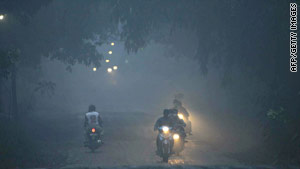It's been nearly a year since the Copenhagen, Denmark, climate summit, and negotiations over implementation of the climate change deal it produced have dragged on with little to show.
They've been slowed by the failure of a climate bill in the U.S. Senate, the global economic recession and increasing gridlock between the United States and China. Around the world, heads of state have been reluctant to provide crucial leadership needed for a breakthrough.
www.wri.org
We need a significant turnaround to show that real progress is possible. In football terms, it's the two-minute warning, and we just got the ball on our opponent's 20-yard line.
There is ever-mounting evidence that our climate is changing. Leading authorities, including the National Academy of Sciences (the top scientific academy in the United States) have reconfirmed the risks of climate change, and the role of man-made greenhouse gases, primarily carbon dioxide, in altering our atmosphere.
Against this backdrop, negotiators in Cancun must get in the game.
Why does it matter what a bunch of diplomats do at a Mexican beach resort?
 Working for a climate treaty
Working for a climate treaty RELATED TOPICS
Competition for clean energy markets is also global. In 2009, China became the world's leader in energy consumption. The United States is now second. While India, with a population of 1.17 billion people, ranks fourth.
www.undpi.org
Demand for energy will continue to grow, and with it increased pressure and new markets for cheaper, cleaner energy sources. In this arena, the United States is falling behind as other countries, such as China, charge ahead.
The picture is clear and action is necessary. Yet the path forward has been mired in the economic downturn and political gamesmanship.
Following are four keys to the upcoming climate meetings:
• U.S.-China dynamics. These two countries, the world's two largest carbon emitters, must find a way to work together toward progress. The United States and other developed countries have called on China to demonstrate greater transparency.
While China has been proceeding with its plan to slow its carbon emissions -- that is, to reduce its carbon intensity (its carbon emissions per unit of gross domestic product) by 40 percent to 45 percent by 2020 compared with the 2005 level -- countries are looking to ensure these actions are internationally verifiable.
For its part, China has called on the U.S. to increase its emissions reduction commitments. The United States has stated it will reduce its emissions by 17 percent by 2020, compared with 2005 levels, yet it is not clear whether the U.S. is serious about meeting this target since comprehensive climate and energy legislation died in the Senate this year.
iplextra.indiatimes.com
Neither side will get all that it wants, but they must move toward common ground and finding solutions, or else there is no hope for getting other key countries on board.
• Major emerging economies and the European Union. South Africa and Brazil will host upcoming major climate conferences and should have a strong interest in making a breakthrough happen. Similarly, countries in the EU already have played leadership roles and can be influential.
These countries in particular should play a more assertive role and take risks. Over the past months, these countries have been locked in their positions when they should be coming forward to work on a common set of solutions.
• Meeting financial commitments. One of the most positive developments from Copenhagen was the agreement that developed countries would provide "fast start" financial support to developing countries to help them in cutting their emissions and adapting to climate change.
Developed countries committed $30 billion at Copenhagen. These commitments have not been fully realized, including those of the United States. Countries need to follow through on their financial commitments and to develop the mechanism -- including a common accounting system and greater transparency -- to ensure that these funds are available to the countries that need them.
• U.S. domestic action. With climate legislation stalled in Congress, the world is wondering if the United States is serious about cutting its carbon pollution. Analysis by the World Resources Institute shows the United States can move forward with reducing its emissions, mostly through the existing authority of the U.S. Environmental Protection Agency and state action.
billionaires.forbes.com
As a demonstration of its commitment, President Obama should reconfirm that the United States will meet its declared goal of reducing its carbon emissions by 17 percent by 2020.
Together, these steps would jump-start action and show that world leaders are serious about tackling this issue. The clock is ticking. We need to start moving the ball forward.
The opinions expressed in this commentary are solely those of Jonathan Lash.







